#advocating for autism awareness and acceptance
Explore tagged Tumblr posts
Text
How I feel being in a relationship with Tech would really be like
Disclaimer : I held absolutely no grudges against writers describing Tech's romantic behavior a little too neurotypical to my taste.
Once Tech figures he likes you too, you'll become his new l'hyperfixation. He'll study you and gathered as much data as he can without actually have to ask any questions. If you have a friend or relative that loves to tell stories about you, they'd be Tech primary source of information.
In the first weeks, maybe months of your relationship, he might spend a LOT of time with you. He enjoys your company but mostly, he's looking for more data! He wants to know everything about you, from your favorite ice-cream flavor to your piloting skills (if you have any)
If one of your passions peeks his interest, Tech will also hyperfocus on that (side quest!!) . You might end up spending hours talking about the subject together, which is great. Until he becomes more knowledgeable than you and starts correcting you with his usual bluntness. I hope you're not too susceptible...!
He'll make a list of things you've talked about and rely on it when looking for gifts ideas. You might get a bunch of stuff you wouldn't have bought for yourself, since Tech can't really tell the difference between small talk and something you actually like a lot.
There most likely won't be much sweet talk and romantic metaphor coming from Tech. Don't try telling him you love him to the moon and back (or whatever the Star Wars equivalent is) and don't expect him to do it neither. Subtle allusions to cuddles will lead you nowhere. If you want a kiss, grab his by the neck or just ask for it! He'll do the same to you.
If one day he feels comfortable telling you he loves you, it won't be a serenade. You'll have to learn how to read the emotions behind his words. Maybe he'll tilt his head a certain way, or he'll squeeze your hand or your thigh but it will be a simple 'I love you'.
If forced to it, he might ramble about why he loves you. It'll be messy, sometime incoherent like starting a sentence but changing his mind midway and going a complete opposite direction. It's cute, though.
He won't celebrate any anniversary and will most likely forget your birthday. He'll k ow the dates, but when the day comes, he won't connect the dots. Partly because his brain doesn't work like that, partly because this kind of stuff means nothing to him. If you ask him to take you on a date or do something special for the occasion, he will do it gladly though, as a chance to spend time with you. But to him it'll be just another Tuesday.
As time passes by, his hyperfocus on you will pass and this is when it might become difficult to maintain the relationship. Tech will still love you, but there'll be another fixation on his mind that he will dedicate a lot of time to. Which will lead to less time together...He'll come home late, forget about date nights, and might not listen to you as much, even intterupt you to infodump.
His gifts might become even more random. Or he'll buy you stuff related to his l'hyperfixation and might have trouble understanding why you don't find it fascinating.
He most probably won't be of any help with chores from day one. He'll do the dishes with you if it means keeping up with your conversation, but don't expect him to clean the floor on his own. If you confront him about it (rightly so!), he'll offer to pay for a house keeper. To avoid further fights, you might consider it seriously!
Tech's definition of a cuddle is him sitting on the couch with his data pad and you laying against him. He'll play with your hair and trace lines on your skin, which feels great, but the actual hugs makes him too uncomfortable.
He'll only initiate hugs in three occasions : when you cry, when you two reunite after spending a few days appart and when making out.
You might feel left out as time goes by, but getting him back to you will only take a good communication. Tech loves you, he just doesn't feel the need to show it as much as you'd want him to. Maintaining a relationship with someone like him takes work, from both of you, and a lot af talking. Chances are you're overanalyzing that thing he said or the reason with he forgot you were going out tonight. Talk to him ❤️
He'll die for you. Literally.
This is way too long but I can't help but give you these too extra treats 🙃
No cute couple photograph. The man doesn't know how to smile on picture and will look either like a retarded or a serial killer.
He'll. comment. the. movie. He'll suggest theories (mostly right so he's basically spoiling the damn movie) and point at plot holes. If it's too scientifically inaccurate, he might just leave.
#Sorry it's so long!!#Still feel free to add to it!#please tell me what you think about this !#advocating for autism awareness and acceptance#tech the bad batch#the bad batch#the bad batch headcanon#I should have proof read it...#El's stuff#star wars chatter#El's chatter#autism#audhd#the autistic batch
3 notes
·
View notes
Text
What if Wrecker does have a low IQ, with a bunch of special interests in which he excels, and yet we still see his value? Still respect and love him?
I feel like he's a beautiful representation of this type of person and a good way to show that it doesn't stop you from living a full and accomplished life amongst people who love you for who you are. And that's enough.
I hope nobody gets offended by this. I respect everyone's thoughts on this, of course!
It's just that to me, denying someone's limits (may they be intellectual limits or anything else) even with the best intentions, can be harmful. Acceptance is the best gift one can receive ❤️
say it with me now:
wrecker👏is👏not👏stupid👏
he is actually pretty smart, you don’t become a demolitions expert without being smart
he is also like 100% the most emotionally intelligent of the entire batch
just because he has a childlike wonder and love of life doesn’t mean he’s dumb
#wrecker the bad batch#The bad batch#advocating for autism awareness and acceptance#El's stuff#El's chatter#star wars chatter#autism#the autistic batch
3K notes
·
View notes
Text
World Autism Awareness Day
Today, April 2, is World Autism Awareness Day. On this day, everyone is encouraged to raise personal and social awareness about autistic individuals throughout the world. Let’s focus on accepting, supporting, including autistic people, and advocating for their rights.

View On WordPress
#accepting#advocating#Autism#Autistic Spectrum#including#inclusion#Social Awareness#Spectrum#supporting#World Autism Awareness Day
21 notes
·
View notes
Text
AJ saw a meme video that they were making fun of people with a diagnosis. He posted his opinion on TikTok and I’m sharing it with all of you. His becoming a great Advocator 💛🌈♾️
#asd#tea#autism#autismo#autistic#autista#audhd#audhder#aa#autuallyautistic#awareness#autism awareness#concientizar#accept#advocate#advocator#autistic and proud#autism acceptance#inclusion#empathy#equality#love#educate#neurodivergent#neurodivergente#neurodiversity#neurodiversidad
3 notes
·
View notes
Text
Autism Acceptance Begins with "Embrace Differences" Narwhal Merchandise
Be You, Be Awesome: Embrace Differences with Our Narwhal Friend!
This adorable design features a playful narwhal swimming alongside a group of fish. But wait, something's different! Our narwhal friend has a magnificent horn, making them stand out from the crowd. This isn't a flaw, it's what makes them special!
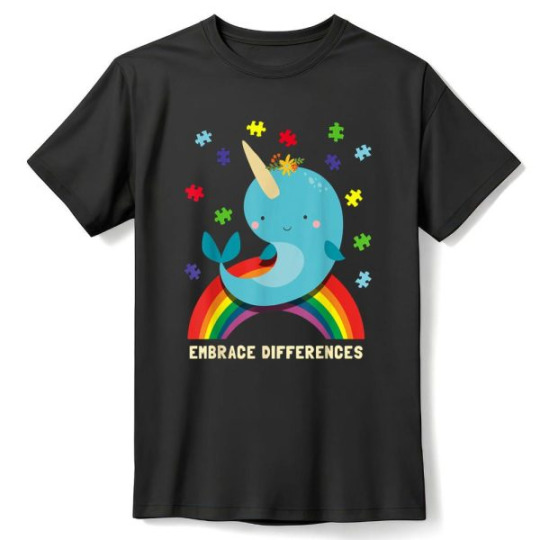
Buy now:19.95$
This [product type] celebrates the beauty of embracing differences. Just like our narwhal friend, everyone has unique qualities and talents. This design is a reminder to be proud of who you are and celebrate the things that make you special.
It's also a message of acceptance and understanding. We can all learn from each other and appreciate the rich tapestry of experiences and perspectives that make up our world.
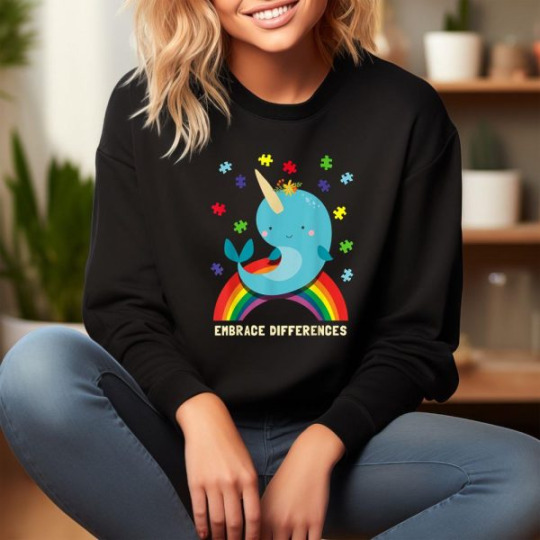
Buy now
This [product type] is perfect for anyone who wants to spread a message of inclusivity and kindness. It's a great gift for children (and adults!) who may feel different or misunderstood. Let's create a world where everyone feels welcome and celebrated for who they are!
Bonus: Pair this product with a book about narwhals or embracing differences for an extra special gift!
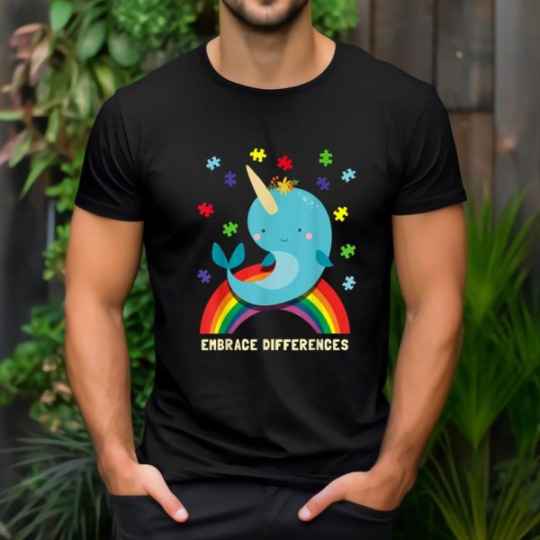
Buy now
This eye-catching design features a vibrant puzzle piece, a symbol for Autism Spectrum Disorder (ASD). Each piece represents the unique strengths and journeys of autistic individuals. Show your support for autism awareness and celebrate neurodiversity with this stylish [product type]. It's a meaningful gift for parents, grandparents, siblings, or anyone who embraces the incredible abilities found within the autism community.
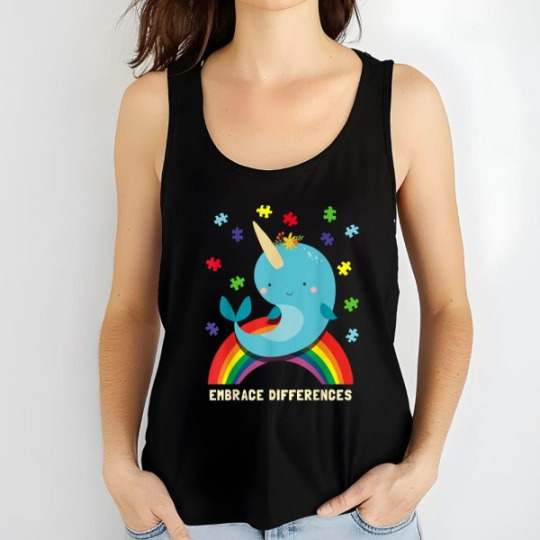
Buy now
Calling all animal enthusiasts! This [product type] is the purrfect way to show off your love for all creatures great and small. Whether you're a dog person, a cat cuddler, or a wildlife champion, this design celebrates the unique bond between humans and animals. Made with [material] (if applicable), this [product type] is a comfortable and stylish way to represent your passion for the furry, feathery, and everything-in-between friends who enrich our lives.
#Embrace Differences Narwhal#Celebrate Neurodiversity (Narwhal)#Be Unique Just Like This Narwhal#Narwhal: A Symbol of Acceptance#Autism Spectrum Disorder (ASD) Symbol#Puzzle Piece for Autism Awareness#Represent Neurodiversity (Puzzle Piece)#Animal Enthusiast#Pet Lover#Furry Friends#Animal Advocate#View all AUTISM GIFTS products: https://zizzlez.com/trending-topics/hobbies/autism-spectrum-awareness-month/#All products of the store: https://zizzlez.com/
0 notes
Text
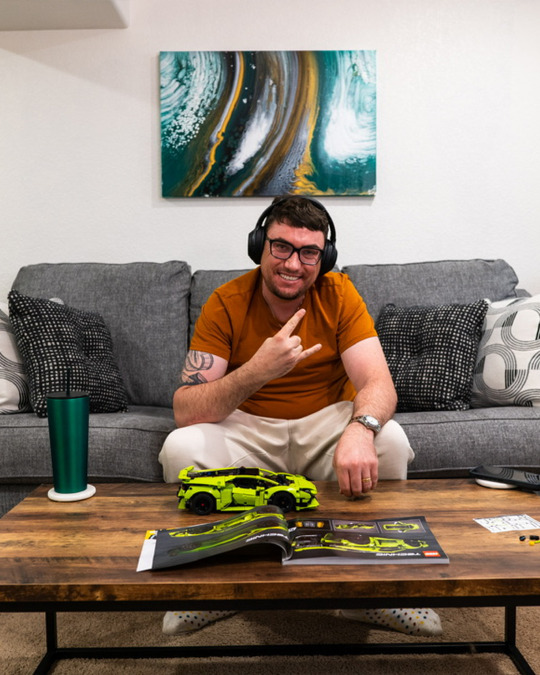
I am 14 years sober today!!! This day is more exciting to me than my birthday because it is the day I decided to change my life for the better and change my life forever. Getting sober was one of the best decisions I could've ever made, and I am so grateful for how my life has turned out. Getting sober has made me more determined and driven, which helps me in my daily life with my home life, mental health, and career. If it weren't for getting sober, I would still be stuck at rock bottom trying to figure out my life and find my way. My life continues to grow with new opportunities, one of which starts later this week, and I cannot wait to share more about it and document my entire experience.
Sobriety was never easy, but because of the hard work I put into it, my life continues to shine through with bigger and better things. Years ago, I would've never thought I would get married while my parents were still alive or have the success in filmmaking I have now. Without sobriety, I believe I would not be where I am today. My sobriety is one of the most important things to me in my life, and I would never trade it for anything in the world.
If you, a friend, or a loved one are struggling with addiction issues, please know that if you are willing to build the courage and take the first step to try and get sober, life can get better. Please feel free to reach out to me, and I would be happy to listen and be there for you however I can. The first steps of recovery are scary and take a lot of work, but from my experience, I can say it is well worth it.
#scott klumb boulder#colorado#autism#boulder#co#Clean and Sober#Sobriety Rocks#Sober Lifestyle#Sober AF#Sober Living#Sober Movement#Sober Nation#Sober Fun#Sober Curious#Sober Community#Sober Journey#14 Years#14 Years Sober#Serenity Prayer#Alcohol#Drugs#Alcohol Free#Drug Free#Autism Acceptance Month#Autism Acceptance#Autism Awareness Month#Autism Awareness#Actually Autistic#Autism Advocate#Autism Support
0 notes
Text
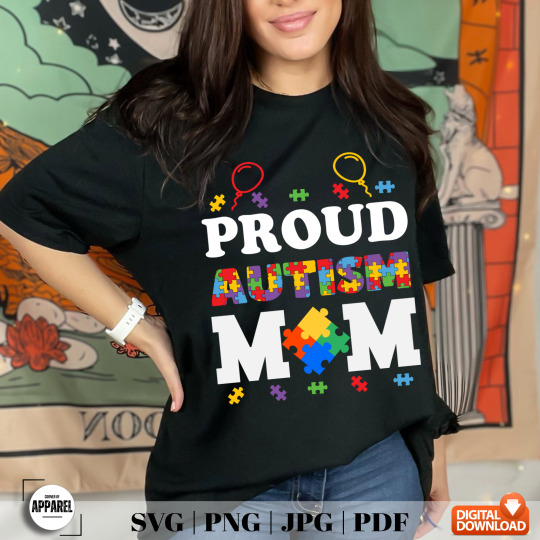
#Autism#Proud Autism Mom#Autism Svg#Autism png#Mother Svg#Autism Awareness Svg#Autism mama Svg#Autism Awarenes#Autism Acceptance#Mother's Day Gift#Autism love Svg#Autism Advocate png#Autism sublimation#Special Needs png#nuerodivergent#autism mother png#mother's day png#Autism Awareness png#Autism Mama png
1 note
·
View note
Text
autism awareness & autism acceptance not either or. not mutually exclusive. can coexist. need coexist.
“there enough awareness for autism already 🙄 we need acceptance”
ok. you aware of high support needs autism? aware what that even means? not “need reminder take meds need remind take shower” “high” support needs autism, but “need full physical help do bADLs lack danger awareness may accidentally hurt self or even kill self without support” high support needs autism? not just higher support needs people who can be independently online do advocacy, but those who need help from others even be online, or those who cannot be online at. all.?
aware of nonverbal nonspeaking people? not just nonverbal nonspeaking people who can write grammatically correct cannot tell apart base on writing. not just nonverbal nonspeaking people who can be online who can advocate online.
aware of nonverbal nonspeaking people who cannot communicate in way that easily understood, either for now, or ever? aware of nonverbal nonspeaking people without functional communication, aware of how without functional communication, how that drastically limit communication, even though behaviors are valid communication? aware of nonverbal nonspeaking people who may never use AAC fluently even with best support?
aware of technically verbal but very limited verbal autistics who may only able say wants & needs but not other things and certainly not online advocacy, “despite being verbal”?
aware of just how much our life depends on caregiver/carer/PCA/etc? aware how vulnerable that make us? aware of abuse from caregivers? aware of caregiver burnout from lack of support for caregivers, & how that impact our care we receive? have you even heard of term respite care? aware of those of us who cannot separate ourselves from caregiver? aware of those of us who cannot participate in autism community without caregiver?
aware of visibly autistic people? aware how we not automatically believed? aware how we often bear blunt of violence because we most easily identified target because we visible? aware visible =/= get support, aware that many those diagnosed severe who now adult so no longer qualify for services under 21 year old, languish in hospitals because nowhere to go? aware how long life saving necessary waitlists are? aware that even to this day parents have to fight school fight day service fight government fight insurance for them give their nonverbal nonspeaking child AAC & be properly taught how use it? actually, are you aware of how properly teach AAC to nonverbal nonspeaking, developmentally delayed child who may or may not have intellectual disability?
actually, aware of autistics with (correctly diagnosed) intellectual disability & how they make up big amount of autistic? aware of institutional systemic & legal impact of mental [r word] right & the human rights abuse justified using r word right? wait, you aware that r word come from old term for intellectual disability, that, actually, still in many laws because no one bothered updating, right? aware of what severe profound ID look like? and aware they real and they still human deserve education deserve life deserve care, yes?
aware of early diagnosis 20 30 or even 10 years ago, not same as now, even less resources & knowledge about autism now? aware that while gender race class 1000% impacted diagnoses, a lot of early diagnosed people early diagnosed because… they die without support unlocked by diagnosis, right? but also, aware that in old times, early diagnosis often did mean doom, not because autism bad or anything, but because severe lack of support & diagnosis can literally bar you from so many things including basic education?
aware that for many people in special education, which impact specific group of autistic people, they not get degree when graduate high school, they just get certificate, which limit their educational & employment opportunities & others?
aware of life saving importance and necessity of masking for autistic of color especially Black autistic people, despite stress inducing traumatic? aware that live in broken system be victim of hate crime & police brutality just as traumatic often even more traumatic than masking? aware that many Black & other parents of color forced to teach their child masking because of this?
are you aware of most marginalized autistic people? aware of leadership of most impacted?
aware you can and need to care about autistic experiences & form of autism you not experience? aware that you can and need to do that without try twist your experience into our experience into our words our community?
aware that advocacy goes beyond about you?
aware that you can’t speak for all autistic? aware that you shouldn’t speak for all autistic?
are you aware of when you need to stop talking & listen & amplify others? aware of when and how to decenter self?
aware that even this long post, barely scratch surface? still so much to say?
[better worded version of original post]
#loaf screm#actually autistic#autism acceptence month#autism awareness#autism awareness month#high support needs#long post#nonverbal#nonspeaking#autism#autistic#autism acceptance
1K notes
·
View notes
Text
Interview with Marcus Boyd [with captions]
First Interview by The Black Autist...ever. Interviewing award-winning autism activist Marcus Boyd; #captions are included
First Interview by The Black Autist…ever. Interviewing award-winning autism activist Marcus Boyd Note: you may also access the transcript at the link below gmt20230108-012403_recording_gallery_1280x720_otter_aiDownload
youtube
View On WordPress
#Activism#Advocate#African Diaspora#Autism#Autism Acceptance#Autism Awareness#Autizzy#Black#Disability#Disability Acceptance#Marcus Boyd#Youtube
1 note
·
View note
Text
Tuesday April 11.
Autism Acceptance Month.
Today is Tuesday, April 11, which means we are eleven days into the 30 blessed days of #autism acceptance month, 2023 (previously known as #autism awareness month). April is the month and April 2nd is the day—World Autism Day, to be precise—and these first weeks of spring are a time for uplifting autistic voices of all identities, advocating for acceptance, progress, and sharing in the community's joy. It began back in 1972, as National Autistic Children’s Week, and was founded by The Autism Society to raise awareness and campaign for change in communities, schools, medical facilities, and businesses. And this same vital, wonderful work continues today, and not just for the month of April, of course—but every day of every year. The lived reality is that every day of every month is Autism Acceptance Month, and it is on all of us to do better.
Progress has been made, but there is still so much to be done in the struggle for equality and justice for all those living under the broad church of autism. And if these words sound hollow, then simply read the moving story of Debra Vines, of The Answer Inc., and of her autistic son Jason. She articulates everyday struggles that families can face, and the many joys they experience, too. Her message is simple, but powerful: don't give up on milestones.
Want to know more, get involved, or donate? Here is just some of an impressive selection of charities sourced by the fine people at the Applied Behavior Analysis Programs Guide, where you can find the complete list of 20 charities and organizations:
The Asperger/Autism Network
The Autistic Women & Nonbinary Network
Autism Research Institute
The Autistic Self Advocacy Network
The Autism National Committee
Happy Tuesday, folks, and here's to better.
#today on tumblr#autism acceptance#autism acceptance month#autism awareness month#autism#aspergers#advocacy#neurodivergent#actually autistic#autistic community#autistic life#neurodiversity
4K notes
·
View notes
Text
i dont like to talk about self-diagnosis because i dont enjoy people making assumptions about me, my illnesses, and my diagnostic status. but i will say:
i have self diagnosed and gone on to be medically validated with an official diagnosis. multiple times actually. i was never wrong about my self-diagnoses.
however, i have been misdiagnosed by professionals FIVE TIMES. and let me tell you, a professional diagnosis being wrong is far more harmful than a self-diagnosis being wrong.
if your self diagnosis is wrong, maybe you used the wrong language or put yourself in a box or now feel invalid and whatnot. but if your professional diagnosis is wrong, it can lead to abuse, medical trauma, panic attacks, issues with medication, even suicide.
i was misdiagnosed with BPD when i was 15 by a psychologist that i spoke to for hardly even 10 minutes. this diagnosis was based on my parent's description of my reactions to abuse, and the diagnosis was used to validate and excuse their abuse.
i was misdiagnosed with MDD when i was 12 and put through several different types of anti-depressants. we never found anything that worked, because it was actually ADHD and dissociation, but i did end up with panic attacks and insomnia all throughout middle/highschool!
when i self-diagnosed with autism however, it saved my life. it took me out of active suicidality because i was able to finally able to accept myself after years of feeling like i am just "being a person wrong". i had the knowledge to accomodate for myself and the language to advocate for myself. this was life changing. even if i was wrong, which i wasnt, i dont see how it couldve caused any harm.
my opinions on self-diagnoses arent black and white, and im not entirely settled on them either, but i do think this is important to understand. doctors and psychologists are not all knowing. we live in a time where we can access thousands of dollars worth of university level education on the internet, even the same exact resources medical students use. plenty of people are capable of interpreting themselves and that information to come to a conclusion about what they are experiencing and what might help.
sure, self-diagnosis might be biased. but a professional is most likely going to be just as biased, and possibly less aware of it. its just silly to use bias as a primary argument when it is an inescapable feature of human psychology. there is a reason ADHD is underdiagnosed in women. there is a reason anxiety disorders are underdiagnosed in men.
an incorrect self-diagnosis wont take away resources or your space in your comminities. but professional misdiagnosis can cause real damage.
(i am not trying to fear-monger about professional diagnosis, moreso responding to the fear-mongering surrounding self-diagnosis)
#self diagnosis#psych critical#actually mentally ill#self diagnosed autism#anti psych#anti psychiatry#discourse tw#tw discourse#madpunk#neurodivergent#neuropunk
1K notes
·
View notes
Text

i am incredibly tired of what the conversation around “afab autism” has turned into. it’s important to spread awareness about people’s experiences with autism that don’t fit into the typical mold in the media, and to support those people because they are frequently not recognized by doctors due to having “atypical” signs of autism. but at this point, the discussion has turned into blatant gender essentialism, in which *all* people who were afab and *all* people who were amab can be fit into simple, undeniable categories due to socialization and biology.
this is especially frustrating when it reinforces stereotypes about women (and let’s be honest, cis people often say afab when they really mean women), except this time in a progressive light. so-called “afab autism” is often presented as being somehow better than the traditional signs of autism that are associated by these people with those who were amab--people with the signs of afab autism are more sensitive, more honest, more moral, more loyal, etc. i see so many posts that make wild generalizations off of the symptoms lumped in as “afab autism” that neurodivergent people as a whole are more enlightened than neurotypicals due to high empathy, a sense of justice, and all the other signs described in the screenshot above.
i fit in an interesting place in this discussion (which is to say, i have no place) because i was afab but i display many more of the signs of typical “amab autism” (i hate to use this terminology so much bc it’s regressive, but i mean the assumptions that this segment of the autistic community associates with people who were amab). to respond to the broad generalizations of the screenshotted IG reel comment: i am sensitive to sounds and textures, i suspect i have alexithymia but have literally no way of knowing bc idk how others even experience emotions, i have low empathy, i have no appreciation for what is typically considered beautiful, i am sensitive to change, and i am that unfortunate person who plays devil’s advocate (not about serious issues, i don’t mean to give the wrong impression).
because of the ways my autism presents itself as a person who was afab, i have been called cruel, selfish, callous, rude, you name it - all for not being able to think and feel in the socially acceptable way. so it’s extremely hurtful to feel the same sentiments coming from my own community, where i should feel supported rather than excluded and dismissed. especially when it’s all in the name of “positivity” for a group that i’m supposed to belong to, even when i don’t want to.
it’s true that autism can present differently in people who were afab, i don’t deny it. but the key word is *can* -- autistic people are not a monolith! and they are especially not a monolith that can fit easily into binary gender essentialist beliefs.
1K notes
·
View notes
Text
Happy autism awareness and acceptance month!
Unfriendly reminder that if you are advocating for autism to not be considered disabled you are advocating for the removal of supports many of us need to function and stay alive! It is by definition a disability, and you should be listening to medium and high support needs autistic people more!
#you can use whatever you want within reason but DO NOT speak for all of us#autism#disability#actually autistic#neurodivergent#lateral ableism#ableism cw#cw ableism#ableism tw#tw ableism#ableism#not a reblog
89 notes
·
View notes
Text
Different Ability Apparel: Dabbing Fox Embraces Neurodiversity
"It's A Different Ability Dabbing Fox" is a playful and empowering concept that combines autism awareness with popular culture. This phrase likely refers to an image or merchandise featuring a cartoon fox performing the "dab" dance move, accompanied by a message promoting neurodiversity.

Buy now:19.95$
The fox, a clever and adaptable animal, serves as a symbol for individuals on the autism spectrum. By depicting the fox in a trendy "dabbing" pose, the image appeals to younger audiences and adds a touch of humor and relatability to the message.
"Different Ability" is a positive reframing of the term "disability," emphasizing the unique strengths and perspectives of autistic individuals rather than focusing on challenges. This phrase promotes the neurodiversity paradigm, which views autism as a natural variation in human neurology rather than a deficit.

Buy now
The combination of these elements creates a powerful, yet lighthearted, tool for autism advocacy. It can be used on t-shirts, posters, or social media to spread awareness and foster acceptance. The image may resonate particularly well with autistic youth or siblings of autistic individuals, providing a fun way to express pride in neurodiversity.
This concept exemplifies the trend of using engaging, youth-oriented imagery to promote important social messages, making autism awareness more accessible and appealing to a broader audience.

Buy now
Animal lovers are individuals who have a deep affection and respect for animals of all kinds. This passion often extends beyond just pets to include wildlife and farm animals. Animal lovers typically:

Buy now
Advocate for animal rights and welfare
Support animal shelters and rescue organizations
Often choose to have pets as part of their family
May pursue careers working with animals (e.g., veterinarian, wildlife biologist)
Promote responsible pet ownership
Support conservation efforts for endangered species
Often follow a vegetarian or vegan lifestyle
Enjoy activities like birdwatching or visiting animal sanctuaries
Stay informed about animal-related issues
May volunteer at animal shelters or wildlife rehabilitation centers
Animal lovers find joy in the company of animals and strive to create a world where all creatures are treated with kindness and respect.
#Different Ability Fox Dabbing Shirt#Dabbing Fox Different Abilities#Inclusive Fox Dabbing Apparel#Positive Different Ability Fox#Celebrate Neurodiversity Fox#Dabbing Fox Empowerment Gear#Unique Ability Fox Shirt#Dabbing Fox Diversity Clothing#Fox Dabbing Autism Awareness#Dabbing Fox Acceptance Tee#Animal Lovers#Animal Lovers Apparel#Wildlife Enthusiast Gifts#Animal Advocate Merchandise#Pet Lover Clothing#Nature Conservation Apparel#Animal Rights Advocacy Gear#Wildlife Conservation Gifts#Animal Welfare Support Products#Eco-Friendly Animal Lover Clothing#View all AUTISM GIFTS products: https://zizzlez.com/trending-topics/hobbies/autism-spectrum-awareness-month/#All products of the store: https://zizzlez.com/
0 notes
Note
You've been calling yourself autistic without a diagnosis?
Yes.
I feel like this ask implies that self-diagnosis is not valid but in order to identify that you need a diagnosis, you have to self-diagnose to an extent. There's still a lot of stigma around someone calling themselves autistic without a diagnosis, but I'm not doing any harm. I'm not getting any support even though I need it, I don't get any disability benefits. In the UK, it is so difficult to get a diagnosis and you can be on the waiting list for years depending on where you live. My niece tried to get a referral and was told they weren't accepting referrals in our area anymore, it's so shit here at the moment.
✨A little bit of Katie lore here✨
I have been on the general adult autism waitlist since February 2022 (and might not even get my diagnosis until 2025 at this point) so as you can imagine that is a long ass time to deal with life without a diagnosis that allows me to get the support I need. On my mum's side of the family, my brother and sister both have been diagnosed with ADHD as well as cousins who have been diagnosed with autism. There is also diagnosed autism on my dad's side of the family. Neurodivergence is widely accepted at this point as being genetic, or at least you can be genetically predisposed to it, so I don't think I'm reaching. I'm at the point in my life where I can identify my own neurodivergence, I'm 26 years old and I'm aware enough that I can identify symptoms going back into my childhood that I wasn't able to identify then due to lack of education and information at that time. To get a referral, I have to display signs of autism so I'm not just pulling this out of nowhere.
At the end of the day, I don't have to share any of this about myself. My autism is something I am still learning to be open about, it is not an excuse I use and I regularly have to push to advocate for myself as well as hold myself accountable. But if you are trying to suggest that I shouldn't say I'm autistic until I have it on a piece of paper then you are clearly not educated enough on me or the autism diagnosis process to call me out for it.
And if I have misunderstood or misinterpreted this ask then....idk kinda proves my point.
20 notes
·
View notes
Text
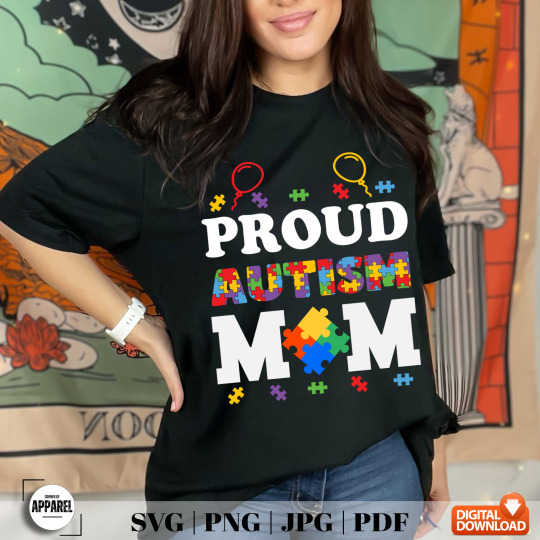
#Autism#Proud Autism Mom#Autism Svg#Autism png#Mother Svg#Autism Awareness Svg#Autism mama Svg#Autism Awarenes#Autism Acceptance#Mother's Day Gift#Autism love Svg#Autism Advocate png#Autism sublimation#Special Needs png#nuerodivergent#autism mother png#mother's day png#Autism Awareness png#Autism Mama png
0 notes